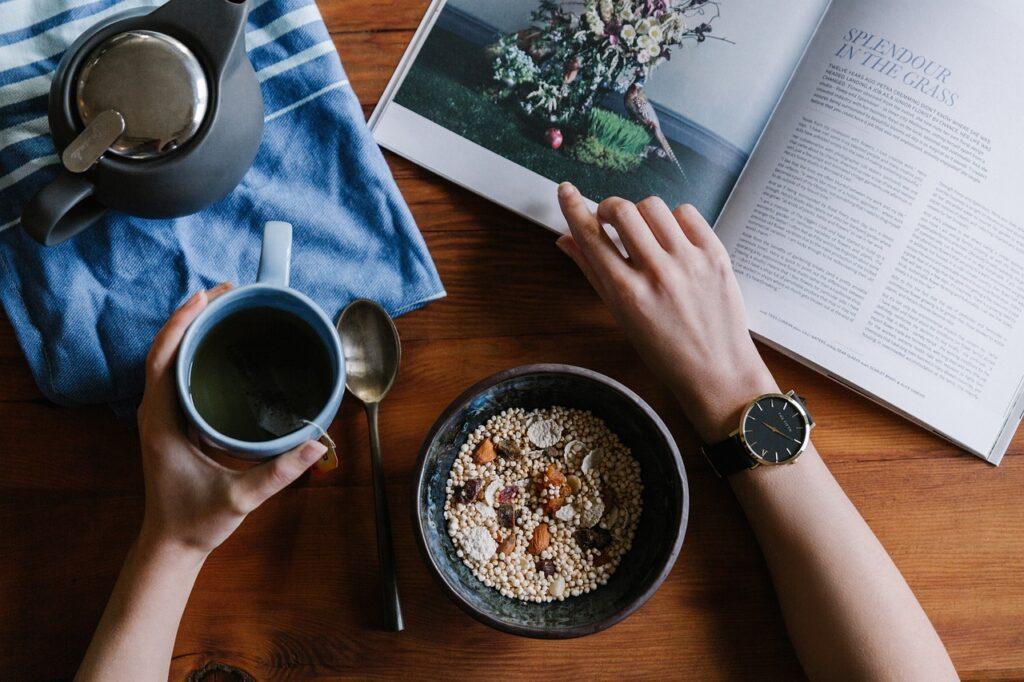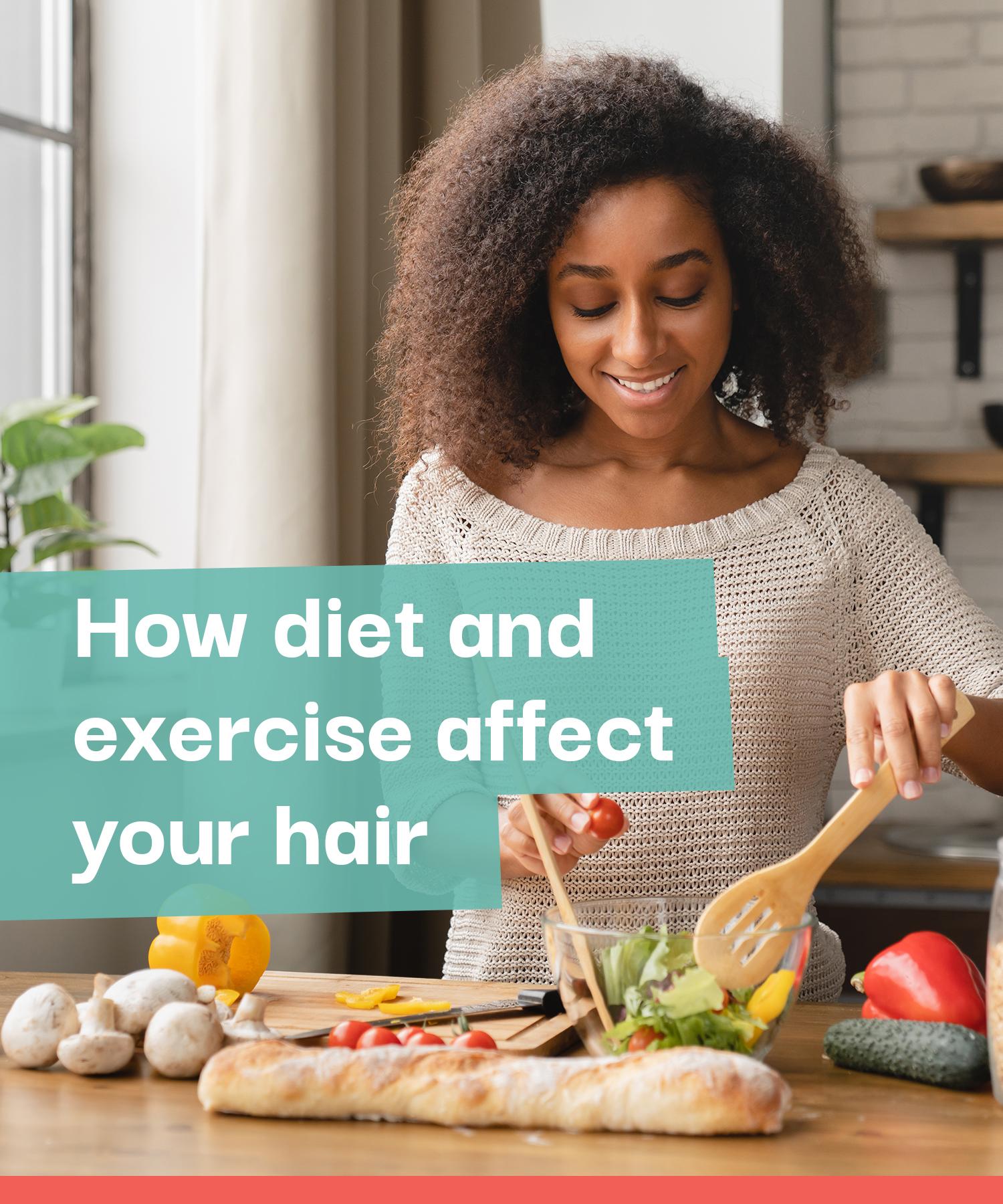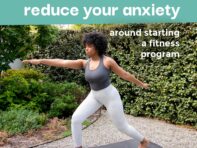Diet and exercise, in addition to hair structure, genetics, and other factors, play a role in the health of your hair. Several studies have found that both diet and exercise affect hair health. But what effect do diet and exercise have on your hair? We've got all the details on how diet and exercise affect your hair and six tips for improving your diet and exercise routine for healthier hair.
The role of diet on your hair

It is common knowledge that the food we eat directly impacts our bodies, including our hair. Food provides your body with the fuel it needs to function and grow, which it obtains from the food you eat in the form of calories, vitamins, and nutrients. One of the reasons why getting the proper nutrients is essential is that they can help your hair grow strong and healthy. A nutritious, well-balanced diet high in protein, vitamins, and minerals can promote healthy hair growth and prevent hair loss.
Aside from ensuring that you're getting enough calories, also include vitamins and minerals known to support hair in your diet, such as:
- Iron.
- Protein.
- Beta carotene.
- Omega-3 fatty acids.
- Biotin.
- Collagen.
- Vitamin D.
- Folate.
- Vitamin B.
- Amino acids.
- Selenium.
- Zinc.
And don't forget about your hydration. Drinking plenty of water and other healthy beverages can help keep you and your hair hydrated, moisturized, and strong. Avoid sugary, nutrient-less beverages like soda, which can cause breakage and dullness by reducing the nutrients in your hair.
A diet deficient in essential nutrients can result in hair loss and other hair-related problems ranging from flaky, dry scalp and split ends to thinning hair or hair loss. The health of your hair can also be harmed by consuming too many processed foods, excessive sugar, and unhealthy fats like trans fats by triggering inflammation, which can damage hair follicles and cause hair loss.
Maintaining a balanced diet is crucial to ensure that the body receives all the nutrients required for healthy hair.
The role of exercise on your hair
Regular exercise can also improve the health of your hair. Exercise increases circulation and blood flow, especially to the scalp, stimulating hair follicles and promoting healthy hair growth. For the overall development of a healthy scalp, healthy follicles, and strong hair growth, this increased blood flow is crucial.
Regular exercise lowers stress hormones, which aids in stress reduction. Stress can damage your hair, resulting in hair loss and thinning. Exercise also helps you lose weight, lower your inflammation levels, and produce more natural oils in your scalp, all of which improve the condition of your hair and scalp.
Regular exercise can be good for your health and your hair, but too much exercise can stress your body out, which can damage your curls and lead to hair loss. However, a sedentary lifestyle can result in poor blood circulation, depriving hair follicles of vital nutrients and causing hair thinning.
Six tips on improving your diet and exercise routine for healthier hair
Since your hair directly reflects your health, shouldn't you take all reasonable steps to maintain its health? Hair loss, brittleness, and dryness are the three most common hair issues that affect women with curly hair. So how do you ensure that your diet and exercise routine is suitable for your hair? The six suggestions listed below can help you have healthier hair by improving your diet and exercise routine.
Start slow, start small, and make a plan.
To achieve and maintain a healthy lifestyle, starting slow and small is essential to developing a diet and fitness plan with small, attainable steps that lead to larger goals. Maintain consistency and keep track of your progress. To keep making progress, however, changes might be required. Setting goals that are regularly reviewed and revised can help to ensure that they are still relevant and doable, and acknowledging small victories along the way can inspire you to keep going.
Incorporate hair health-boosting vitamins, minerals, and nutrients into your diet.
Add more fruits, vegetables, and lean proteins into your diet to provide essential vitamins and minerals for hair health. Add some fresh bananas and blueberries to your oatmeal or grain bowl for breakfast. Lunch could be a kale-packed leafy green salad with your favorite veggies, fruits, and protein like chicken, fish, beans, or tofu. A power smoothie can help get you through that mid-day slump.
Try to reduce your intake of processed and fried foods, which can contribute to hair damage and breakage.
Get moving regularly.
Regular physical activity increases blood flow to the scalp and reduces stress, both of which can help prevent hair loss. Aim for at least 30 minutes of moderate exercise three days a week, such as jogging, cycling, or swimming, to improve circulation and promote hair growth. You can incorporate workouts and activities that support hair health, such as:
- Strength training to develop muscle, which improves circulation.
- Cardio to increase the release of hair's natural oils, improve blood circulation, and reduce stress.
- Jogging, which helps with better blood flow, mood regulation, and hair health.
- Yoga improves blood circulation and lowers stress, which promotes better scalp health.
It is important to consult with your doctor or primary care physician before starting any exercise routine.
Remember to rest.
Get enough sleep to allow your body to repair and regenerate, including your hair. Not getting enough sleep can cause hair loss, breakage, and a dull appearance. Prioritize your rest and ensure you get the recommended seven to nine hours of sleep each night.
Reduce or effectively manage your stress.
Stress can be linked to hair loss, thinning, and lifeless or dull hair. In the long run, stress causes the production of the hormones cortisol and noradrenaline, which inhibit new hair growth. By lowering your stress levels and finding ways to relax, you can promote healthy hair growth by reducing these hormones.
Stay well hydrated.
Water makes up nearly 25% of a single hair strand's weight and makes up 60% of the body. The nutrients your body and hair need are carried by and enhanced by water. Because it supports your hair follicles, proper hydration directly impacts the growth of your hair and promotes overall health.
By getting an adequate amount of water or other healthy beverages, such as coconut water, unsweetened tea, or fruit-infused water per day, you can strengthen your hair and promote growth.
A healthy diet and regular exercise routine can help to improve hair health. You can encourage healthy hair growth, strong bouncy curls, and hair loss prevention by supplying vital nutrients via a well-balanced diet and enhancing blood circulation through regular physical activity.
Striking + Strong supports you in all your active, curly, wavy, kinky-coily, and fabulous glory. We've got you covered from the gym to wash day and every day in between. We'll do our best to provide the products, but you still need your diet and exercise to match your overall health goals.





